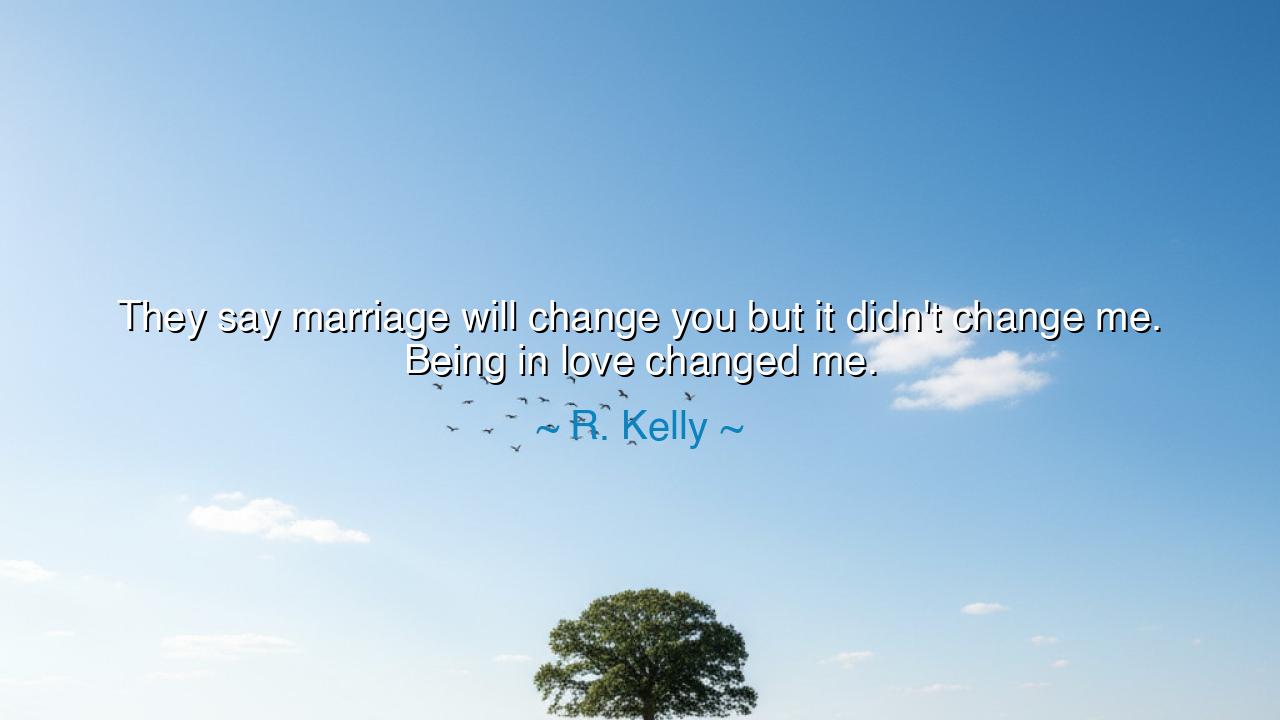
They say marriage will change you but it didn't change me. Being






"They say marriage will change you but it didn't change me. Being in love changed me." These words from R. Kelly reflect a timeless truth about the nature of love and commitment. The expectations surrounding marriage often lead people to believe that the institution itself is what transforms a person. But Kelly’s statement goes beyond the societal notion of marriage as a transformative act; he reveals that it is love, not the formal contract of marriage, that shapes and changes a person. Marriage may serve as a framework for a relationship, but it is the love within that union—the deep connection and the emotional bond—that truly alters the individual.
In ancient Greece, the philosophers understood the importance of love in shaping one's character. Plato in his dialogues, especially in the Symposium, described love not as a mere physical attraction but as a transformative force that leads the soul towards greater wisdom and virtue. In his view, love was the path to becoming a better person, a higher version of oneself, capable of transcending base desires and reaching for the divine. Marriage, in the ancient sense, was often seen more as a social contract, a union to ensure the survival of the family, the inheritance of wealth, or the continuity of bloodlines. But the true change in an individual came from the emotional and spiritual connection that could arise from love, not simply the act of getting married.
Consider the great love story of Heloise and Abelard, two figures of medieval Europe whose love transcended the conventional ideas of marriage and sacrifice. Their relationship was not born out of an arranged union or a societal duty, but out of an intense, intellectual, and emotional connection. Despite the tragedy that befell them—Abelard’s brutal castration and their eventual separation—their love remained a transformative force in both their lives. Heloise famously expressed in her letters that Abelard’s love had changed her profoundly, not just emotionally, but intellectually and spiritually. Their union was not marked by the formality of marriage but by the deep love they shared, which remained the cornerstone of their identities, shaping their very paths in life. This illustrates that, just as Kelly suggests, it is love that brings about true change, rather than the institution of marriage itself.
In Rome, the philosopher and statesman Cicero wrote about the power of love in his letters and speeches. He often described love as a guiding force in human lives, one that could elevate individuals to achieve greatness, both in their personal lives and in society. Cicero’s own life was marked by deep affection for his wife, Terentia, whom he valued not merely as a partner in his political ambitions but as someone who shared in his intellectual and emotional journey. Their bond, based on love, transcended the mere contractual obligations of marriage and was foundational to Cicero’s strength and resilience. R. Kelly’s reflection resonates with this, reminding us that it is not marriage alone, but love, that defines and changes us, shaping our very character.
The lesson in R. Kelly's words is powerful: change does not necessarily come from the legal or social bond of marriage, but from the profound emotional transformation that love brings. Love is the force that reaches deep into a person’s heart and soul, challenging them to grow, to become better, and to expand their capacity for empathy, understanding, and connection. Marriage, then, is not the source of change, but love within the marriage is. Marriage may give structure, but it is the love shared between partners that becomes the true transformational experience.
The key takeaway here is to focus not just on the external structures of relationships—whether that be marriage, commitment, or societal expectations—but to pay attention to the internal connection between two people. The love you share with another is the real force that shapes who you are and who you become. Marriage, though important, is simply the vessel that carries this love forward. It is the bond of deep affection, mutual respect, and shared growth that leads to true transformation in a person.
So, as you walk through your own life, remember this: love is not something that changes because of a ring on your finger or a contract signed before witnesses. Love changes you because it challenges you to expand, to grow, to become more than you were before. Whether you are married or not, love is the force that will shape your soul and define the person you become. Nurture love, not as an obligation, but as the transformational power that guides you through life, and you will find that the greatest changes in your heart come not from outward events, but from the inner devotion you offer to another.






AAdministratorAdministrator
Welcome, honored guests. Please leave a comment, we will respond soon